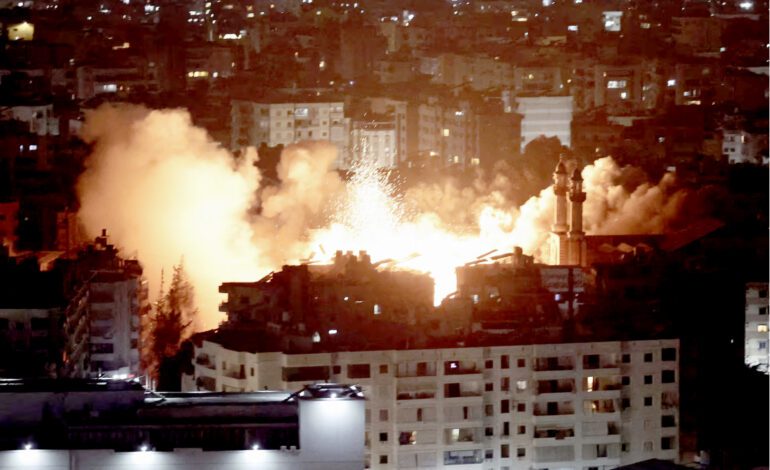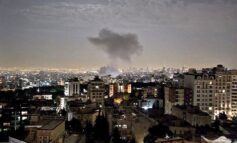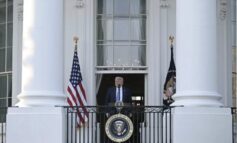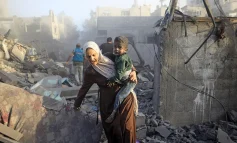The past week brought no breakthroughs in the multiple flashpoints across the Middle East. Israel’s genocidal campaign against Palestinians in Gaza raged on, alongside escalated military aggression on Lebanon and Syria. Meanwhile, negotiations between the United States and Iran made no meaningful progress, as Tehran insisted on its right to enrich uranium — a key sticking point that continues to stall diplomatic advancement.
“Gates of hell” in Gaza
Eid al-Adha offered no respite for Palestinians in Gaza. Israel intensified its military operations under the label “Opening the Gates of Hell”, in retaliation for Hamas’s rejection of a U.S.-brokered proposal submitted by Netanyahu’s right wing extremist government and the group’s demand for significant modifications to its core provisions.
Khalil al-Hayya, Hamas’ senior leader, stated in a televised speech Thursday that Hamas did not reject U.S. envoy Steve Witkoff’s proposal outright, but instead offered amendments aimed at securing a permanent ceasefire and preventing further Israeli aggression. He affirmed Hamas’s readiness to hand over governance in Gaza to any agreed-upon professional Palestinian national body.
Al-Hayya accused the Israeli government of rejecting all proposals submitted since March, including partial prisoner exchanges and a comprehensive deal to release all captives in exchange for ending the war. He attributed the rejections to the personal and ideological agenda of Israeli Prime Minister Benjamin Netanyahu.
He noted that Witkoff’s latest proposal involved releasing 10 living captives and 18 corpses over the span of one week, but lacked guarantees of a permanent ceasefire. Netanyahu’s repeated statements about resuming hostilities after the hostages’ return, al-Hayya added, reveal the Israeli government’s lack of genuine intent to halt its assault.
He further revealed that Hamas had accepted another U.S. proposal two weeks ago, which was then dismissed by Israel, and the American mediator subsequently withdrew his support — proving, in al-Hayya’s view — that Israel was the main obstacle to achieving a lasting and effective agreement.
While Witkoff submitted his proposal to both Israel and Hamas at the end of last month, he later criticized Hamas’ response. The group, however, did not dismiss the proposal outright. Instead, it used it as a launching point for genuine negotiations, outlining several essential conditions that must be met: a ceasefire lasting several years; full Israeli withdrawal from Gaza; unimpeded entry of humanitarian aid without Israeli oversight; and the reopening of the Rafah crossing, which embodies all Palestinian demands.
These conditions, Hamas insisted, were not merely political demands, but essential guarantees for any potential settlement. Any agreement that fails to include them would amount to a temporary truce, inevitably followed by another round of violence.
In his address, al-Hayya also delivered messages of support to Palestinians in the West Bank and within Israel, calling for intensified popular resistance against settlement expansion and Judaization projects. He emphasized that the struggle was existential — not a mere political or territorial dispute.
He warned that the events in Gaza were the beginning of a broader ethnic cleansing project targeting the West Bank, the 1948-occupied territories and even the diaspora refugee camps. He urged a unified national and Arab stance to thwart this plan.
Al-Hayya praised the “sincere brothers” in Yemen for continuing to fire rockets at Israel despite the hardships they face. He declared that Gaza had sacrificed itself for the sake of the nation and its holy sites, and called for political, popular and military support proportional to the scale of the sacrifices made by Gaza’s residents.
Humanitarian aid crisis
Al-Hayya also criticized Israel’s insistence on maintaining full control over humanitarian aid, imposing what he called a “military mechanism” rejected by all international organizations for violating international humanitarian law and obstructing dignified and safe relief operations.
The U.N. Secretariat echoed these concerns, stating that Israeli authorities were obstructing coordination for humanitarian deliveries into Gaza, and calling for the opening of all crossings to ensure the free flow of aid.
Meanwhile, the U.S. and Israeli-backed private organization Gaza Humanitarian Foundation resumed food aid distribution Thursday after suspending operations for a day following the killing of around 30 people by Israeli fire near one of its distribution centers. According to its media office, the foundation distributed 1.4 million meals that day across two centers, and a total of 8.4 million meals since May 27.
In contrast, hundreds of Médecins Sans Frontières (Doctors Without Borders) staff staged a protest in Geneva to denounce what they termed the “militarization of humanitarian aid” in Gaza by Israel. Protesters carried a large banner reading, “Gaza: All red lines have been crossed”, demanding an end to the Israeli blockade and unrestricted humanitarian access.
Like several U.N. agencies and NGOs, Médecins Sans Frontières refuses to cooperate with the Gaza Humanitarian Foundation due to its affiliation with the United States. Throughout the past week, Israel continued killing dozens of Palestinians daily in Gaza, bringing the confirmed death toll to 54,677 with 125,530 wounded since October 7, 2023, according to Gaza’s Health Ministry.
U.S. support and political rift with Netanyahu
Despite mounting signs of divergence between Trump and Netanyahu — including the dismissal of several staunchly pro-Israel officials from the White House — the U.S. did not hesitate to use its veto at the United Nations Security Council to block a resolution calling for an immediate ceasefire and unimpeded humanitarian access to Gaza.
The Iranian Foreign Ministry condemned Washington’s veto, stating that America’s opposition to the resolution — despite support from the other 14 Council members — demonstrated its complicity in Israel’s war crimes in Gaza.
The United States remains the largest political and military supporter of Israel in its war on Gaza since October 2023. According to the International Missile and Ordnance Database (IMOD), the U.S. has supplied more than 90,000 tons of military equipment to Israel via 800 air shipments and approximately 140 sea shipments. These have included munitions, armored vehicles, protective gear, medical supplies and more.
Although many analysts agree that while Trump is unlikely to fully sever ties with Israel, he stunned observers by abruptly firing three officials perceived as being highly favorable to Israel — including Morgan Ortagus, the U.S. envoy to Lebanon. According to the Israeli newspaper Yedioth Ahronoth, the firings were linked to growing tensions between Trump and Netanyahu, particularly as Netanyahu continues threatening unilateral military action against Iran without U.S. consent.
The dismissed officials included Merav Sarn, a dual U.S.-Israeli citizen recently appointed head of the Iran-Israel desk at the National Security Council; Eric Trager, Middle East and North Africa coordinator at the same council; and Morgan Ortagus, deputy to U.S. envoy Steve Witkoff in Lebanon.
Yedioth Ahronoth also noted that further dismissals of pro-Israel figures in the Trump administration were possible. The paper pointed out that Israel also lost another key ally in Trump’s circle: billionaire Elon Musk, who had helped mend the relationship between Trump and Netanyahu after their 2020 election fallout, during which Netanyahu was among the first to congratulate Joe Biden on his victory despite Trump’s claims of electoral fraud.
According to the Israeli newspaper, these dismissals were not arbitrary, but reflected the deepening rift between Netanyahu and the Trump administration.
Iran’s nuclear program and Egypt’s diplomatic pivot
One of the most consequential developments of the past week was the diplomatic rapprochement between Egypt and Iran — a move that reshaped the region’s political landscape. After feeling marginalized by both Washington and the Gulf states during President Trump’s latest Middle East visit, Cairo decided to significantly enhance its ties with Tehran. In a phone call between Egyptian President Abdel Fattah el-Sisi and Iranian President Masoud Bazeshkian, both leaders emphasized the importance of preventing regional military escalation, especially in light of Iranian Foreign Minister Abbas Araghchi’s visit to Cairo.
This renewed Egypt-Iran dialogue occurred as U.S.-Iran nuclear negotiations in Oman reached a standstill. CNN reported that a sixth round of indirect talks between Washington and Tehran had yet to be scheduled due to a fundamental disagreement over uranium enrichment.
To date, five rounds of talks have taken place under Omani mediation. According to Araghchi, Oman proposed mechanisms to help bridge remaining gaps, raising hope for a potential breakthrough within one or two more rounds. However, the core obstacle remains Washington’s insistence that Iran abandon its uranium enrichment program — an unacceptable demand, according to Iranian officials. Government spokesperson Fatemeh Mohajerani reiterated Tehran’s refusal to leave the negotiating table, asserting that conflicting U.S. statements remain the primary impediment.
President Trump, for his part, expressed hope that Iran would reconsider the American proposal, but warned of “dire consequences” should Tehran remain defiant. He stressed that the U.S. proposal prohibits any uranium enrichment, contradicting earlier media leaks suggesting allowances for limited civilian-level enrichment.
Following a phone conversation with Russian President Vladimir Putin, Kremlin aide Yury Ushakov announced that Trump had sought Moscow’s help to mediate with Tehran.
“Trump believes Russian assistance is essential and would be grateful if Moscow could soften Iran’s stance,” Ushakov said.
Israeli attacks intensify against Syria and Lebanon
Israel’s military actions this past week extended beyond Gaza and the West Bank. The far-right Netanyahu government escalated its attacks on both Lebanon and Syria under the pretext of neutralizing emerging security threats.
As Lebanon awaits the arrival of a new U.S. envoy, southern Beirut endured its heaviest night of airstrikes since the November 2024 ceasefire. Israeli drones and fighter jets conducted 13 air raids shortly after the the Israeli occupation forces issued evacuation orders in Hadath, Haret Hreik and Burj al-Barajneh — claiming the targeted areas housed Hezbollah drone manufacturing sites.
Israeli media described the strikes as the most extensive since the truce began. Israeli forces activated advanced missile defense systems in northern Israel and urged settlers to heed emergency instructions from the Home Front Command.
“We will not allow any threat to endanger our northern citizens or Israel at large,” Israeli Defense Minister Israel Katz warned. “We will enforce the ceasefire terms with zero tolerance.”
He added that the Lebanese government bears full responsibility for any violations.
The Israeli military alleged that Hezbollah is rapidly expanding its drone manufacturing capabilities with Iranian backing. Meanwhile, Lebanese Prime Minister Nawaf Salam reported that the army had dismantled more than 500 weapons depots south of the Litani River since the war’s end. Nonetheless, Israel retains control over five strategic positions in southern Lebanon.
In Syria, where the U.S. recently welcomed the integration of foreign fighters into the “New Syrian Army”, Israeli jets launched multiple strikes across the country in response to two rockets fired from Syrian territory toward the occupied Golan Heights. Israel used the incident as justification to deepen its aerial campaign against Syria — despite increasing Western openness toward the newly formed Syrian government in Damascus, led by transitional president Ahmad al-Sharaa.
Israeli Defense Minister Gallant blamed al-Sharaa for the cross-border rockets. Syria’s Foreign Ministry condemned the Israeli strikes and accused various regional actors of seeking to destabilize the country for their own agendas. A new militant group calling itself the “Mohammed Deif Brigades” claimed responsibility for the Golan attack. The group reportedly formed in late May.
Asked by Reuters whether Washington had endorsed integrating foreign fighters into Syria’s reconstituted military, U.S. special envoy to Syria Thomas Barrack — who also serves as ambassador to Turkey — said, “There is understanding and transparency regarding al-Sharaa’s plan to incorporate some 3,500 foreign fighters, mainly Uyghurs from China and neighboring countries, into a newly established unit.”
The fate of these fighters, many of whom were previously affiliated with extremist groups like Hay’at Tahrir al-Sham, remains one of the most contentious issues in Syria’s effort to normalize ties with the West.
Yemen: Resistance as the sole option
Abdul-Malik al-Houthi, leader of Yemen’s Ansar Allah movement, reiterated unwavering support for the Palestinian people amid what he described as Israel’s “monstrous crimes” in Gaza. In his Eid al-Adha message, al-Houthi pledged continued resistance and vowed that his group would stand shoulder to shoulder with Palestinian fighters until victory is achieved and the Israeli regime is removed from existence.
He condemned the ongoing aggression as a historical crisis enabled by U.S. and British support, complicit European governments, biased international institutions and the betrayal of Arab regimes pursuing normalization. He insisted that supporting the Palestinian cause is not only a religious obligation but also a moral and human duty that no Muslim or Arab can shirk.
Al-Houthi warned that normalization efforts amount to treason and provide Israel with political cover for its crimes.
“How can Arab governments rush to normalize with a regime that bombs children and women, destroys residential towers, and commits genocide?” he asked, declaring such conduct a sign of moral collapse.
Yemen’s head of state, Mahdi al-Mashat, also emphasized that Israel’s expansionist ambitions threaten not only Palestine but the entire Arab and Islamic world — including Lebanon, Iran and Yemen. He urged Arab and Muslim nations to reconsider their weak and complicit positions toward Israel.
Yemen’s armed forces, aligned with the Houthi movement, have continued targeting Ben Gurion Airport in Tel Aviv in retaliation for the Gaza massacre. In a statement, the Yemeni military described their operations as a stand for Palestinian dignity and a rejection of Israel’s war of extermination, while rebuking the Arab and Islamic world’s failure to end the bloodshed.






Leave a Reply